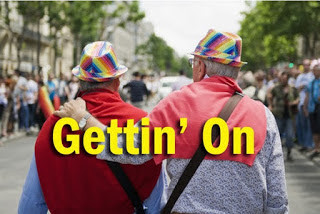From the Philadelphia Gay News
July 21st, 2016
By David Griffith
What do you want your retirement to look like? For most, the answers to this question follow similar themes. We want time to relax and enjoy leisure activities. We want the opportunity to vacation in our favorite destinations and travel to new places around the globe. We want to cherish the time spent with family, friends and loved ones.
Retirement can provide great opportunities for older adults to celebrate life’s many accomplishments while pursuing new and exciting endeavors. Whether through traveling, adopting new hobbies, exploring creative outlets or volunteering, retirement can be filled with many fascinating and fulfilling experiences.
Yet, retirement can also be fraught with challenges and the struggle to make ends meet while no longer working. Retirement is expensive, with high health-care, housing and daily living expenses, all without the reliability of a weekly paycheck. For those without pensions, 401ks or ample savings, retirement is not always the leisurely time that most wish it would be.
There is a common narrative in society that LGBT communities are generally wealthy and financially secure. This narrative follows that, because LGBT people are less likely than their non-LGBT counterparts to have had children, that they therefore have vast quantities of disposable wealth. We see this narrative frequently reinforced in the media — think of the well-dressed, fashion-forward, materialistic gay character in all-too-many media depictions of queer people.
Under this “gay-wealth” narrative, retirement for LGBT people is seen as another opportunity for the glamorous life of exotic travel, fine dining and nights out at the theater. Does retirement look like that for some LGBT people? Sure, and there is nothing wrong with that. But the LGBT people meeting this narrative represent only a very small segment of LGBT older-adult populations.
The gay-wealth myth overshadows the reality of aging for many in our LGBT communities. In reality, the research and statistics on LGBT aging and financial security routinely paint a picture that is quite the contrary to the tale described above. Many LGBT people may have saved money by not incurring the expenses of raising children, but they’ve also been fired from their jobs, denied promotions, faced discrimination in educational settings and been denied access to partner benefits. Decades of institutional discrimination have severely cut short the lifetime-earning potential of a large segment of the community.
Data from UCLA’s Williams Institute suggest that 24 percent of lesbians and 15 percent of gay and bisexual men are poor, compared to 19 percent and 13 percent of heterosexual women and men, respectively. A 2014 report from SAGE (Services and Advocacy for GLBT Elders) found that LGBT older adults were far more concerned than non-LGBT elders about their financial security and ability to retire.
The SAGE report found that 47 percent of LGBT elders reported being “very concerned” or “extremely concerned” that they would not be able to live the lives they want in retirement due to lack of money, as compared to only 28 percent of non-LGBT older people. LGBT people were also disproportionately more likely to believe that they would have to work beyond retirement age, would outlive the money they had saved for retirement and would be unable to financially deal with unexpected emergencies in retirement.
Transgender communities, in particular, face these economic hardships and the financial insecurity that hinders retirement. Lifetime experiences with discrimination in housing, education and employment are even more pronounced for transgender people than LGB people. The 2010 National Transgender Discrimination Survey found that trans individuals were nearly four times more likely to have a household income of less than $10,000 per year compared to the general population.
It is necessary that we as an LGBTQ community push back against the myth of gay wealth, as this misconception overshadows the realities that many LGBT individuals face every day. It prevents the broader community from better understanding the needs of our communities. It skews the views of social workers, aging-services providers, financial planners and others who will provide services to us as we get older.
Having to work past the typical retirement age, worry about outliving one’s savings and lacking the financial capacity to deal with challenges in retirement is a far cry from the version of retirement perceived under the myth of gay wealth. The better we understand the realities of aging and retirement within our communities, the more prepared we will be to help LGBT people of all income levels to age successfully and enjoy their retirements in the ways that they deserve.

